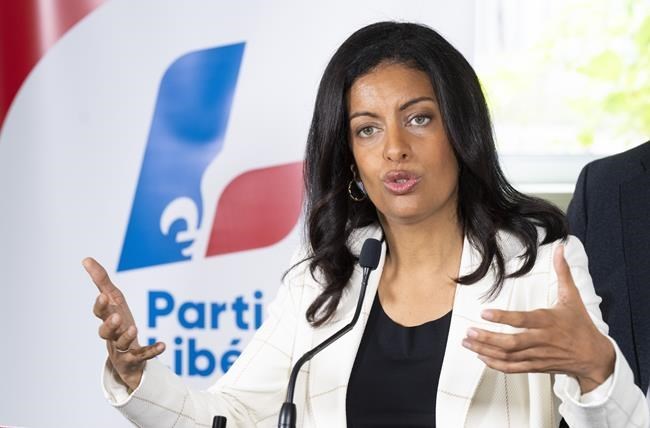
Quebec Liberal leader Dominique Anglade responds to questions during a campaign stop in St-Lambert, Que., on Wednesday, September 21, 2022. THE CANADIAN PRESS/Paul Chiasson
Republished September 21, 2022 - 2:51 PM
Original Publication Date September 21, 2022 - 1:06 AM
MONTREAL - The final leaders debate of the Quebec election campaign Thursday is one of the few remaining opportunities for the parties vying to unseat the governing Coalition Avenir Québec to set themselves apart, analysts say.
Recent polls show the four parties that formed the opposition in the previous legislature are in a virtual tie -- far behind the CAQ -- meaning the debate on Radio-Canada may be more decisive in determining who is the next leader of the official Opposition than in deciding the next premier.
"The CAQ is so far ahead right now that the issue of the campaign, and what's being watched, is who will succeed in distinguishing themselves to become the leader of the official Opposition," said Antonine Yaccarini, a political analyst and a director at public relations consulting firm TACT.
The French-language debate remains a major television event in Quebec and is a chance for the candidates to speak directly to voters -- especially those who may not be following the campaign closely, Yaccarini said in an interview Wednesday.
For example, much of the media coverage of Liberal Leader Dominique Anglade's campaign has focused on her party's poor showing in the polls, Yaccarini said, "but we won't be talking about that during the debate. It will be more about the ideas, so it's an opportunity for the leaders to get certain voters to know them."
Yaccarini, who worked as a chief of staff and communications director in the CAQ government of François Legault, said the parties battling for second have strengths in specific regions, and she expects the leaders to focus on reaching people in those regions.
It will take a lot for one of the four to rally opposition to the CAQ behind them, said David Heurtel, a political analyst and former Quebec Liberal cabinet minister.
"None of the opposition parties, the four parties, have been able to establish themselves beyond their core messages and haven't been able to establish a credible ballot question and a credible alternative," he said in an interview Wednesday, adding that Legault's campaign has not been strong either.
One of the factors people will be watching is how the leaders present themselves, said Philippe Dubois, a professor of public and political communication.
During the first debate last week, Legault appeared annoyed at times and bored at others -- which was discussed at length in the Quebec media, Dubois said. None of the leaders want that kind of attention a week an a half before the Oct. 3 vote, he said.
It would take something truly extraordinary in the debate for Legault to tumble from the top of the polls, Dubois said, but the televised exchange remains important.
"An election campaign is never over until people have finished voting, and an electoral debate, it's one of the rare moments in a campaign nowadays where a majority, or at least a very large proportion of the electorate, is watching the same event at the same time, seeing the same things," he said. That means the stakes remain high.
"A serious gaffe, a bad performance, that could have consequences for the incumbent premier, but it could also have consequences on the four other party leaders who are trying to establish themselves as the leader of the official Opposition and premier in waiting," he said.
Earlier on Wednesday, Anglade said Quebec needs to have a discussion after the election about electoral reform, but she said she doesn't have a solution in mind.
"I think this conversation needs to happen, there are things in our system, indeed, there are distortions that have to be looked at, but this conversation, we have to have it together," she told reporters in St-Lambert, south of Montreal. "My commitment is to have that conversation. Obviously with my political party, but also with Quebecers."
A split vote — and concentrations of support in specific regions — could see some parties get fewer seats than the popular vote would suggest.
Daily polls by Mainstreet Research have shown support for the Conservative Party of Quebec at almost 20 per cent, but modelling by the polling firm suggests that the party will get zero seats.
"You can see a scenario where Québec solidaire, or the Conservatives, Éric Duhaime, is in second in terms of popular vote, but the official Opposition is the Liberals or another party," Heurtel said. "That's the problem with our parliamentary system when you have such a fractioned electorate and so many parties."
Anglade was the only major party leader who spoke with reporters Wednesday, as the others spent the day preparing for the debate.
This report by The Canadian Press was first published Sept. 21, 2022.
News from © The Canadian Press, 2022